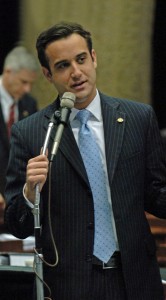We used to start our day in grammar school by standing up, facing the flag, and saying the “Pledge of Allegiance” TOGETHER, IN UNISON. It was a great way to start a day of working together, playing together, and learning together as American children with no hyphenated distinctions separating us.
|
When I worked in Industry I was involved in rolling out a Statistical Production Control System for the department I worked in. I was very interested in being involved because, with a modest science background, I have always liked numbers. That overstates it a bit. I like good numbers, accurate numbers, numbers that can be verified. Good solid reliable numbers. During the rollout of Statistical Production Control System I immediately ran into conflict with some of the management team. They liked charts and graphs. They wanted to see results. They especially wanted to see results that confirmed their preconceived notion of what, both, the problem and the solution was. I thought a better initial method would be to concentrate on getting the best possible data before trying to interpret what it means. Ignoring the reliability of your input data to arrive at a pre-determined answer can only be done for one of two possible reasons, incompetence, or deception. The first reason speaks for itself and while damaging at least it is not malicious. To falsify science or analysis for your own purposes I think is especially damaging. By using the cover of reason to create perverted results for personal reasons you have not only presented false and misleading solutions but also the entire process of analysis has been badly used.
Read the rest of… Most would agree that “economic growth” is essential to our recovery. And implicit is the notion that without growth we will not significantly create jobs and reduce unemployment. First let’s look at the most commonly proposed answer to our twin deficits.
Thus what we need is a new approach and here it is: I. Put the construction industry back to work by a nationwide new construction program to house the homeless. II. Tens of thousands of bricklayers, electricians, contractors, welders, framers go back to work. And as a direct result, so to will growth be restored to appliance manufacturers, wall paper manufacturers, and such manufacturers of related ingredients as wiring, faucets, fireplaces, paint, fertilizer, nurseries ad infinitum. Unemployment roles will be reduced, tax revenues increased and growth restored. III. But from whence commeth the money to fund this enormous program of land acquisition and construction? From two sources (to be mandated by legislation): philanthropic organizations and from pension profit sharing, IRA’s, and other tax exempt retirement plans. IV. But how do these plans recoup their investment and earn a return on their investment. After a period three years, each homeless project will be converted to Section 8 Housing for the elderly and handicapped. This is a Housing and Urban Development Program for Elderly and Handicapped for low income people. Under the program the Tenants pay essentially 30% of their income (usually just social security income) as rent and HUD subsidizes the balance of the rent to bring such rent to “fair market rent” for the locality in which each project is located. The organization for the HUD program is already in place, is exceedingly organized and administered (though not without potential for improvement). The shortage of available housing for the elderly and handicapped is enormous and there are long waiting lists for housing among eligible people. But, most important, well managed projects make a reasonable return on investment for their owners and have potential to increase in value. Moreover, the aging of the US population is well known and indisputable: thus the ongoing need for increasing the available supple of suitable housing is incontrovertible. V. Finally, rules would have to be established that would required construction standards to be followed that will ease the eventual conversion of each project from “Housing for the Homeless” to “Housing for the Elderly and Handicapped.” Summary: Thus in one simple to understand plan is at least a partial solution to not just one but several urgent national problems: (a) restoring growth to the economy, (b) reducing unemployment, (c) providing living with dignity accommodations to the homeless, and (d) providing reasonable and necessary housing to our aging populace and disabled citizens. Updates to this proposal may be found at the author’s website: https://sites.google.com/site/wealthcreationretention/home
2. Blanket primaries – Shouldn’t the goal of any election to be to elect the best candidate regardless of political party or persuasion? Some states have already implemented top-two, non-partisan blanket primaries with success. The city of Kansas City, Missouri currently does this with its Mayoral election. Just last winter this system resulted in the two most qualified candidates for the job reaching the general election. Basically, this election method puts all candidates, regardless of party affiliation, on the same ballot in the primary. The top two voters then face off in a general election to be held usually in the next one to three months after the primary election. I can’t count the number of times Republicans came up to me and said they were sorry they couldn’t vote for me because I wasn’t on their primary ballot. This system would also stop candidates from running so far to the right or left to win the votes of party primary voters. We all know voter turnout is low in primaries. Most Americans are sick of voting for extreme candidate 1 or extreme candidate 2 in general elections. They want common sense solutions and are tired of partisan rhetoric. It doesn’t have to be a nonpartisan election; candidates can voice their party affiliation, but why not just have the two best candidates face off in the general election based on the issues of the day and ideas. Blanket primaries will solve many of our general election malaise.
Read the rest of… RP Nation loyal reader Kay Rupp discovered this decades-old video which offers a unique solution to our nation’s political problems. Watch it and enjoy:
Last week’s political fast was rough on a number of you. Even the RP failed to live up to his promise by appearing on Fox & Friends last Friday. But for those of you good doers out there, we have a reward. This week’s posts on The Recovering Politician will be dedicated to the proposition of making our political system a better one. Fixing Politics will be our mantra. Two particular qualifications: 1. We will be hearing from a number of our readers who offer challenging, outside-of-the-box ideas to make American democracy stronger. You may love ’em or you may hate ’em, but remember, these views, as always represent those of the writer only and not the management at the RP. 2. We’d really love to hear from you as well. We are hoping the comments section will be filled with your reactions to the articles posted. And hopefully some new ideas as well. So please enjoy, and better yet, help participate during Fixing Politics Week. Who knows? Maybe one of your ideas will be adopted by our powerful readership and set the country on the right course. Or more likely, will at least give some of us more confidence that we are living in a truly participatory democracy. As Politics Free Week comes to a close tomorrow, we are already looking forward to our next venture. As promoted earlier, the week of August 22, we will dedicate the site every day to what’s wrong with politics and how it can be fixed. We’ve already received several submissions, but we still want to hear from you. Please send us your essays on how to fix the American political system — one specific part, or the whole darn thing (1500 words or less) — by Saturday night, August 20 to Staff@RecoveringPolitician.com. It’s up to you, RP Nation. Please join us! I hope you enjoyed today’s posts as much as I did. Our RP Nation is filled with some outstanding writers with some beautiful stories. We ended a few minutes ago on an important note. As Phil Osborne suggests, don’t forget to tell your father (and all of your loved ones) how much you love them. If you are lucky enough to have Dad still in your life, make sure to tell him today. Say it now.
This is the second Father’s Day I’ll spend without mine. He passed away in March 2010. He would have been 79 last month. We had an interesting, and sometimes tumultuous relationship. He was an absentee dad because he had to be. That’s where his jobs were. Long-haul trucker, construction worker, shift worker at factories, military service. You get the picture. But when he was home, I have fond memories of hours at Fultz’s pay lake in Carter County where we’d fish for bluegill and mud cats. Or the special Christmas gifts that my sister and I would make like cutting little ovals into a carton of cigarettes to insert our latest class photos. Low budget production. But we were never really close. And now we’ll never have the chance to be. He grew up in Carter County, as did my mother. He dropped out of school at 16 and lied about his age to get into the Army. He was a decorated veteran of the Korean War and was stationed in Alabama in 1953 when I was born. When he was discharged, he came back to Carter County and held a series of jobs before we moved to Ohio when I was four. There, we lived in what is euphemistically referred to now as federally subsidized housing. We called them the projects. That’s when the call of the road came and he started trucking. So between truck driving and some factory work my mother took on, we made it through three years in Warren, Ohio. Then, back to Carter County and the little community of Globe. More trucking, but then he landed a construction job in Winchester. Sometimes he would come home on weekends; sometimes we would visit him staying with my aunt and uncle in the Clark County version of the projects at Stephenson Heights. But income was more predictable. We moved to Winchester when I was in fourth grade and moved out of the projects and into our own modest little house the next year. I graduated from high school in that house. When he secured a good paying and steady job at Rockwell, we were set. No more worries about absentee fatherhood, which put us in the house together to argue, fuss, fight and fume. All fathers and sons have their issues. We had enough for two families on occasion. I’m not writing this as a “woe is me” bit of narrative. I got some lucky breaks in my life that my father never did and I’m thankful for it. And I’m thankful that life’s lessons have made me a better person because of who we were and what we did while I was under his roof. I loved my father. Problem is, I never told him. And I know he loved me, he just didn’t say it. Nearly every conversation with my wife, mother or any of our four children ends with “Love you.” That never happened with my dad. The only time I told him was when I kissed him on the head at Clark Regional Medical Center and said goodbye for the last time after he had passed away.
William Amon “Doodle” Osborne. I love you. |
| ||
| Copyright © 2026 The Recovering Politician - All Rights Reserved | |||











